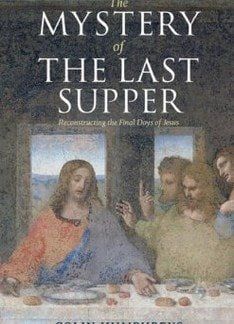The Mystery of the Last Supper
Colin J. Humphreys
Cambridge University Press
244 pages, £14.99
ISBN: 978-0521732000
Star rating: 4
The last time I can recall being as excited by a book as I was by Colin Humphreys’ The Mystery of the Last Supper was when I read John Wenham’s Easter Enigma in 1984. What Wenham did for resurrection narratives in the Gospels, Humphreys has done for the New Testament accounts of the Last Supper.
The consensus within biblical academic circles for many years has been that it is impossible to harmonise the accounts of the Last Supper. Matthew, Mark and Luke all state clearly that the final meal Jesus ate with his disciples was a Passover meal as seen, for example, in Luke 22:15: ‘Then He said to them, “With fervent desire I have desired to eat this Passover with you before I suffer”.’
John 18:28 states, ‘Then they led Jesus from Caiaphas to the Praetorium, and it was early morning. But they themselves did not go into the Praetorium, lest they should be defiled, but that they might eat the Passover.’ In 19:14, John tells us Jesus was tried and crucified on ‘the Preparation Day of the Passover.’
In this impeccably and exhaustively researched book, Sir Colin Humphreys, who is Professor and Director of Research at the Department of Materials Science and Metallurgy at the University of Cambridge, provides a cogent, convincing and simple solution to what F. F. Bruce once referred to as ‘the thorniest problem in the New Testament.’ With consummate scientific skill and precision, Humphreys peals back the biblical, historical, chronological and astronomical layers of the enigma, to reveal that in reality there are no discrepancies between Matthew, Mark, Luke and John regarding the date of the Last Supper and the death of Christ.
The apparent discrepancy between John and the Synoptic Gospels, he shows, is due to the fact that John was working to the official Jewish calendar observed by the Sadducees, the Zealots and the Essenes and that Jesus, the ‘New Moses’, established his New Covenant on the exact anniversary of the Exodus. After the Babylonian captivity, many of the former exiles continued to follow the Babylonian calendar (the months of the Jewish calendar to this day reflect the Babylonian calendar) so some kept the Passover according to the Babylonian calendar while others followed the pre-exilic calendar.
So, according to Humphreys’ calculations, the Evangelists all agree that the Last supper took place on 12th Nisan (Wednesday 1st April AD 33) and that Jesus died at 3.00pm on 14th Nisan (Friday 3rd April AD 33) at the very time the Passover lambs were being sacrificed.
Humphreys manages to do all this in a style that is as gripping as a P. D. James mystery. At the start of the book, he tells you what he is going to tell you; then he tells you; then he tells you what he has told you. And he does the same in each chapter. For academics, there are copious endnotes.
Rabbi Tovia Singer, in the book that accompanies his series of anti-missionary presentations Let’s Get Biblical, points to the apparent discrepancies between the narratives of the Passion in John and the Synoptics as proof positive that the New Testament is so confused it cannot be a divine revelation. The delicious irony is that Humphreys’ brilliant piece of detective work not only allows us to have confidence in the Gospel narratives themselves but also to see that they can be reconciled only when they are read as genuinely Jewish documents. This should be a caution to well-meaning Christians who claim the Bible ‘interprets itself’ without our needing to take into account the cultural background and chronology. There is some truth in that view but as an absolute rule it fails. The Bible from Genesis to Revelation is Jewish, and every pastor and Bible teacher has a duty not only to have The Mystery of the Last Supper on their bookshelves but also to read it!
Mike Moore
CWI








